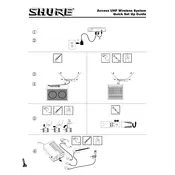Shure UHF User Guide


Ensure the antennas are positioned at a 45-degree angle and elevated to reduce obstructions. Connect them to the receiver using quality cables and ensure the frequency range is compatible with your device.
Check for interference from other devices, ensure the antennas are fully extended, and verify that they are not obstructed by metal objects. Re-scan for available frequencies if necessary.
Yes, but you need to ensure each antenna system is on a separate frequency band to avoid interference. Use a frequency coordination tool or software to manage this setup.
Regularly check for physical damage to the antennas and cables. Clean connectors with appropriate contact cleaner and store in a dry, dust-free environment when not in use.
Keep cable lengths as short as possible to minimize signal loss. Generally, a length of up to 10 feet is recommended. Use low-loss cables for longer distances if needed.
Verify that the antenna is connected to the correct input, check for any kinks in the cable, ensure the receiver is powered on, and confirm the frequency settings match the transmitter.
Yes, by using antenna distribution systems and amplifiers. Ensure that the extended setup adheres to local regulations regarding RF transmission.
Environmental factors such as physical obstructions, other electronic devices, and the presence of metal can impact performance. Additionally, incorrect frequency settings and poor cabling can also affect signal quality.
Routinely inspect before each use for professional applications, or at least once every few months for casual use. Look for wear, corrosion, and secure connections.
Yes, high humidity can lead to corrosion of connectors and affect overall performance. Use weather-resistant connectors and store equipment in a controlled environment when not in use.